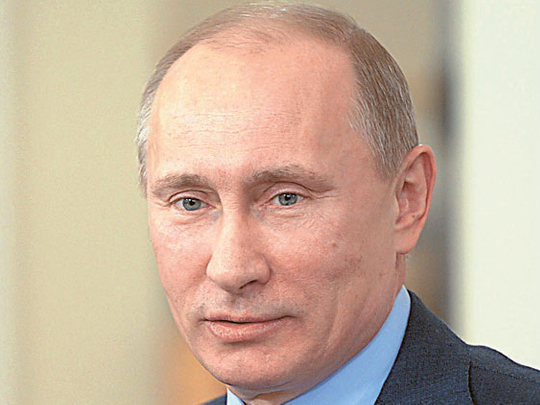
Vladimir Putin's inauguration to a third term as Russia's president yesterday, after a first-round victory in March elections, shows he is both shrewd and skilful. He is also very lucky, in a way that should worry us.
Putin's great luck comes from his timing. The fate of the Russian economy — and the popularity of its leaders — is closely tied to the price of petroleum. Oil and gas account for almost two-thirds of Russia's exports, and about half of the federal government's revenue.
Putin first took office as then president Boris Yeltsin's prime minister in August 1999, when global oil prices had just passed their lowest point since the early 1970s. During his first two terms as president, global oil and gas prices more than tripled. Thanks to a flood of petroleum revenue, the Russian economy boomed, incomes soared, and budget deficits were replaced with surpluses.
When Putin stepped down in 2008 and transferred the presidency to Dmitry Medvedev, he held a remarkable 85 per cent approval rating. Small wonder that so many Russian voters have fond memories of his previous terms as president.
The decade-long boom in oil and gas prices may have been good for the Russian economy, but it was bad for Russian democracy. Putin used his popularity to roll back freedom of the press, keep opposition parties off the ballot, and render the parliament and regional governments toothless. Oil tends to repel democracy in other regions, too.
From Venezuela to Angola, and Iran to Myanmar, a decade of high oil prices has helped dozens of autocrats cling to power. The turmoil in the Middle East probably helped Putin by boosting oil prices and giving the Russian economy an injection of cash in the months leading up to the vote. Petroleum is not always bad for democracy.
Siphoning off funds
Much depends on a ruler's ability to keep the flow of oil riches hidden. Treasure turns to trouble when rulers quietly siphon off money for friends and allies.
In April 2010, Putin signed a decree that suspended the publication of information about the assets, revenue and expenditure of Russia's two oil funds. This allowed him to conceal the health of the government's finances, while launching a pre-election spending spree. He boosted military and police spending by 33 per cent, and promised future pay and pension increases for the armed forces, teachers and doctors.
To this day, few Russians realise they have been fleeced. Other oil-funded autocrats have used the same strategy. Since the early 2000s, President Hugo Chavez has sharply reduced the transparency of Venezuela's state-owned oil company, while using it to finance his movement's slush fund.
Damning report
This month, a report from the Revenue Watch Institute, a New York-based non-profit group, noted that beginning in 2008 Iran's central bank stopped disclosing information about deposits into, and withdrawals from, the country's oil funds. Since then, tens of billions of dollars have apparently gone missing from the funds.
In Washington, the link between covert oil payments and dirty politics has not gone unnoticed. In fact, a provision in the 2010 Dodd-Frank Wall Street Reform and Consumer Protection Act seeks to address the problem. Buried in the depths of the legislation is a provision — Section 1504 — that would require US-based oil, gas and mineral companies to disclose the payments they make to governments around the world.
The logic is straightforward: When the citizenry knows how much money a government is collecting, it will disarm an autocrat by demanding more accountability. Yet the American Petroleum Institute, the oil industry's lobbying arm, has threatened to sue the Securities and Exchange Commission if it issues the rules that will put the new law into effect.
One year after its original deadline, the SEC has yet to act. The SEC should insist that companies report their payments on a project-by-project basis, instead of merely at the country level. Oil companies that claim to support transparency should embrace this approach instead of blocking it.
There is little evidence that greater openness would put US companies at a disadvantage; in fact, the European Union has proposed a similar measure, and investment firms say they would gain valuable information from the new disclosures.
Putin's election should remind us that oil revenue can be a force for both good and evil. The more transparent that oil companies become, the more likely that citizens — and not dictators — will benefit from their countries' natural-resource wealth.
— Washington Post
Michael L. Ross is a professor of political science at the University of California, Los Angeles. He is the author of The Oil Curse: How Petroleum Wealth Shapes the Development of Nations.









